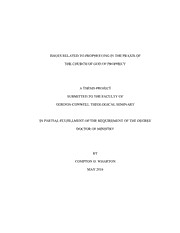Table Of ContentISSUES RELATED TO PROPHESYING IN THE PRAXIS OF
THE CHURCH OF GOD OF PROPHECY
A THESIS-PROJECT
SUBMITTED TO THE FACULTY OF
GORDON-CONWELL THEOLOGICAL SEMINARY
IN PARTIAL FULFILLMENT OF THE REQUIREMENT OF THE DEGREE
DOCTOR OF MINISTRY
BY
COMPTON D. WHARTON
MAY 2018
Copyright © May 2018 by Compton D. Wharton. All Rights Reserved
To my life’s companion, and Learning Assistant for the Doctor of Ministry Program,
K. Margaret Wharton
Thank you
I will pour out my Spirit on all flesh, your sons and daughters will prophesy.
— Joel 2:28
CONTENTS
ACKNOWLEDGEMENTS viii
ABSTRACT ix
CHAPTER 1: THE PROBLEM IN ITS SETTING 1
Introduction 1
General Issues of, and Clarifying of the Prophesying Praxis Topic 3
Brief Introduction to COGOP: Organization, & Development 5
Tomlinson, A. J.: An Introduction 8
COGOP’S Crucial Links to Pentecostalism 9
Tongues & Interpretation of Tongues: An Alternative to Prophesying 13
Issues to be Considered in the Prophesying Praxis of COGOP 15
Connecting Chapters: The Issue of Prophesying 16
Conclusion 18
CHAPTER 2: LITERATURE REVIEW 19
Precedence 19
Early Historic Understanding of The Prophesying Praxis 20
Thoughts on Prophesying & Preaching 21
Early Christian & Jewish Spirit Manifestations and Ancient Mediterranean
Oracular Phenomenon 25
Global Spirit Manifestations & Issues: 30
Prophesying in the Asian Context 30
Prophesying in the African context 37
Spirit Outpouring at Azusa Street 38
v
On Cessationism 40
Conclusion 44
CHAPTER 3: BIBLICAL & THEOLOGICAL FOUNDATIONS 45
Introduction 45
The Old Testament & the Prophesying Praxis 46
Moses, the 70 Elders & Sharing of the Spirit’s Anointing 49
Samuel, Saul & his Messengers 51
Prophesying Praxis & the Potential for Error & Deception 56
Jeremiah & Prophetic Counterfeiters 56
The Balaam Paradigm 58
A Brief New Testament Survey: 62
Joel 2 & Acts 2: A Foundational & Theological Discussion 62
Luke & Paul 65
Conclusion 69
CHAPTER 4: PROJECT DESIGN 71
Introduction 71
Research Methodology 72
Basic Questionnaire 72
Primary Interviews 74
Adrian Varlack 74
Andrew Husbands 84
Statements 98
Carlyle Collins 98
vi
Clayton and Sonia Martin 98
Guyana 99
For the Record: D H Queener (COGOP Minister: A Prophet?).
L V Jones 100
Conclusion 101
CHAPTER 5: OUTCOMES AND CONCLUSION 102
Introduction 102
Thesis Interaction 103
The Problem in Its Setting 103
Literature Review 104
Biblical & Theological Foundation 105
Project Design: Primary Interviews 107
Statements 110
The Need to Discern or Evaluate Oral Spirit Messages 112
Towards A Pentecostal Discernment Methodology 113
Guidelines for Judging/Discerning the Prophesying Praxis 120
Conclusion 121
APPENDIX 123
BIBLIOGRAPHY 127
VITA 133
vii
ACKNOWLEDGEMENTS
A special thanks to my sister Lyn Wharton, for the dedication of her precious time
resource and skill in assisting with the thesis-project’s grammar and syntax.
Thanks to my son Compton Jr., and wife Jennifer, for the commitment of their
finances, that enabled the successful completion of the project. To my daughter, Dahlia
Najfus, thanks for your continued prayer and encouragement.
To Dr Mary Riso, whose professional skills as an Editor, provided the fine tuning
that was essential to the thesis’ qualifying to Gordon-Conwell’s standard.
Hector Ortiz, PhD, is the visionary behind this COGOP educational initiative. We
will be eternally grateful to him and his supporting “Dolly Mama.” Eldin Villafane, PhD,
a towering educational pillar, whose support of this program proved pivotal to its success
– thank you.
viii
ABSTRACT
THE ISSUES OF PROPHESYING IN THE PRAXIS OF
THE CHURCH OF GOD OF PROPHECY
Prophesying is an issue with diverse understanding within the global Christian
community. As the focus of this thesis, it is not a reference to ‘preaching’, but rather, an
enablement to speak under the influence of the Holy Spirit, without prior preparation or
premeditation.
The target group for this ministry praxis investigation will be the century year old
Pentecostal organization - the Church of God of Prophecy. The thesis is an inquiry into
how this Spirit speech manifested during this institution’s existence. In this fleshing out
of the prophesying praxis problem, consideration will be given to historical details, Bibli-
cal and theological factors, literary contexts, personal interviews, and historical docu-
ments of the target group. Since this Spirit speech has exhibited a historic tendency for
misuse and abuse, this aspect will also be addressed.
A conclusion will seek to evaluate the specific findings of the project, and if
needed, offer measures to assist the beneficial operation of this prophesying praxis.
ix
CHAPTER 1
THE PROBLEM IN ITS SETTING
Introduction
Since the late nineteenth and early twentieth century, when Pentecostal adherents
experienced the “tongue” phenomenon due to some special Spirit visitations, they natu-
rally claimed a link with their New Testament biblical counterparts as evidenced in the
Spirit outpouring of the Acts Chapter 2 Pentecost Day experience. It is noteworthy that
on that historic day, Peter, who was the apostle of the event, when justifying the strange
manifestations, quoted a prophet who never mentioned “tongues” as associated with the
coming Spirit’s outpouring, but rather specifically stated that they would “prophesy.”
Paul, addressing the issue later, after that Pentecost Day, sought to introduce decency and
order in the Spirit’s supernatural manifestations. He is the apostle who linked the
“tongues” phenomenon to the prophet Isaiah, and not directly to Joel’s prophetic utter-
ance. As he states in I Corinthians 14:21, “In the Law it is written: With other tongues
and through the lips of foreigners I will speak to this people, but even then they will not
listen to me.”1
It should be noted, however, as the New Testament scholar Gordon Fee states,
that it is difficult to doubt that Paul did see the prophesying phenomenon as evidence of
the Spirit’s eschatological outpouring as promised by Joel 2:28-29:2 “And afterward, I
1 1 Corinthians 14:21. NIV Translation. Unless otherwise indicated, all Scripture quotations are
from the New International Version.
2 Gordon D. Fee, God’s Empowering Presence, The Holy Spirit in the Letters of Paul (Grand Rap-
ids: Baker Academic, 1994), 892.
1

